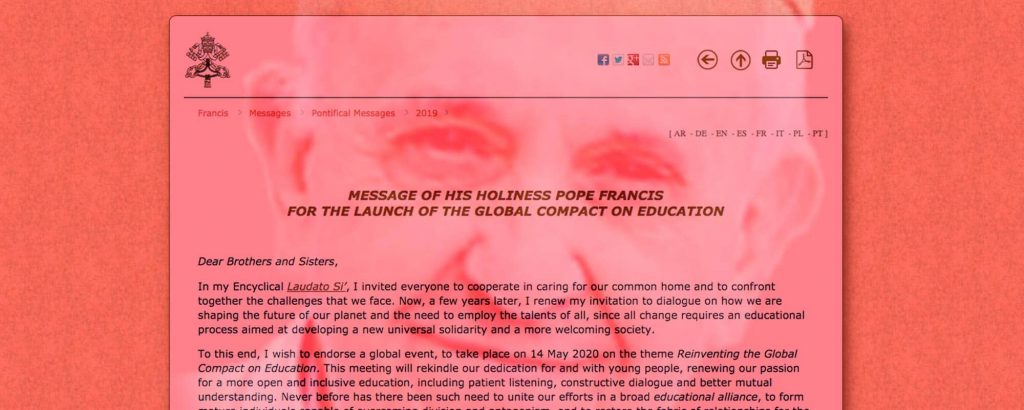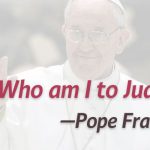
The Pope’s “Launch of the Educational Alliance”, commented
MESSAGE OF HIS HOLINESS POPE FRANCIS
FOR THE LAUNCH OF THE EDUCATIONAL ALLIANCE
Dear Brothers and Sisters,
In my Encyclical Laudato Si’, I invited everyone to cooperate in caring for our common home [which is in heaven] and to confront together the challenges [the temptations in life, the sinfulness] that we face. Now, a few years later, I renew my invitation to dialogue on how we are shaping the future of our planet [which is passing] and the need to employ the talents of all, [Talents are the gifts the Lord has bestowed upon us all, for which He will ask an accounting at the Great Judgment] since all change requires an educational process aimed at developing a new universal solidarity [“solidarity” is not in our Christian vocabulary] and a more welcoming society.
To this end, I wish to endorse a global event, to take place on 14 May 2020 on the theme Reinventing the Global Educational Alliance. [Is this the aim, the goal – the mission - of a religious leader?] This meeting will rekindle our dedication for and with young people, [what about us, the young people of yesterday?] renewing our passion for a more open and inclusive education, [yeah, we know what this language means: inclusion, diversity, equity, embracing the pro-choice, incest, homosexuality, gay marriage and other holistic fruits] including patient listening, constructive dialogue and better mutual understanding. Never before has there been such need to unite our efforts in a broad educational alliance, to form mature individuals capable of overcoming division and antagonism, and to restore the fabric of relationships for the sake of a more fraternal humanity. [We are brothers when we have God as our Father and the Church as our mother.]
Today’s world is constantly changing and faces a variety of crises. [What’s new?! Πάντα ῥεῖ] We are experiencing an era of change: a transformation that is not only cultural but also anthropological [you left out religious], creating a new semantics while indiscriminately discarding traditional paradigms. [Like virtue, ethics, pride, etc] Education clashes with what has been called a process of “rapidification” that traps our existence in a whirlwind of high-speed technology and computerization, continually altering our points of reference. As a result, our very identity loses its solidity and our psychological structure dissolves in the face of constant change that “contrasts with the naturally slow pace of biological evolution” [We can address this rapid “progress” (read “regress”) with the Christian weapons of prayer, spiritual life, life of virtue and obedience to God’s commandments, especially the “new commandment” of love.] (Laudato Si’, 18).
Every change calls for an educational process [I would replace this expression with fidelity, obedience, imitation of Christ] that involves everyone. There is thus a need to create an “educational village”, [first and foremost in our hearts, which then will spread to those around us: family (not even mentioned in the Pope’s message), parents, wider family (uncles, cousins, grandparents, etc. who have almost eclipsed), neighborhood (which exists only physically, not socially), church (also not mentioned) and school (if private, so much the better)] in which all people, [keep dreaming that we will achieve this utopia, when our own faith communities splinter and our country is divided] according to their respective roles, share the task of forming a network of open, human relationships. [This is the core problem with the Pope’s message: it’s all on a human level. There is no inspiration: sursum corda!] According to an African proverb, “it takes a whole village to educate a child”. [It takes a good teacher to educate a class. We have the best, the Rabbi Jesus, and we have His teachings and His example to follow, with the Grace of the Holy Spirit He sent us by the mercy of God the Father.] We have to create such a village [We already have it, but the Pope overlooks it, ignores it. It’s called Church.] before we can educate. In the first place, the ground must be cleared of discrimination [Faith is not discrimination if it’s true, that is accompanied by love, if love truly embraces everyone] and fraternity must be allowed to flourish, as I stated in the Document that I signed with the Grand Imam of Al-Azhar on 4 February this year in Abu Dhabi. [This document needs a separate analysis.]
In this kind of village it is easier to find global agreement about an education that integrates and respects all aspects of the person, [complete person is a Saint, in the image and likeness of Christ] uniting studies and everyday life, teachers, students and their families, and civil society in its intellectual, scientific, artistic, athletic, political, business and charitable dimensions. An alliance, in other words, between the earth’s inhabitants and our [Creator? No, our] “common home”, which we are bound to care for and respect. An alliance that generates peace, justice and hospitality among all peoples of the human family [Yeah, which is something Christianity cannot do, since it addresses only Christians, and not even all of them, since they are fragmented to a zillion pieces] as well as dialogue between religions. [This is totally unnecessary. Why involve religions? We can do it without them, since they can only divide us!]
To reach these global objectives, our shared journey as an “educating village” must take important steps forward. First, we must have the courage to place the human person at the centre. [The man is at the center, the human self, the new god we can all worship, we can all agree upon, in whom we can all be united – instead of placing the Theanthropos Christ at the center of our existence.] To do so, we must agree to promote formal and informal educational processes that cannot ignore the fact that the whole world is deeply interconnected, and that we need to find other ways, [because religion, all the religions of the world have failed us, whereas our new a-religious union is welcome by everyone] based on a sound anthropology, of envisioning economics, politics, growth and progress. In the development of an integral ecology, [Yes, ecology, not theology] a central place must be given to the value proper to each creature in its relationship to the people and realities surrounding it, as well as a lifestyle that rejects the throw-away culture. [a culture based on obsolete models of religious beliefs. We are our saviors, and we need no others beside ourselves. This is the great message we should all embrace and move forward, to the new era dawning for humanity, for our common mother earth, freed from the superstitions of the past.]
Another step is to find the courage to capitalize on our best energies, creatively and responsibly. [instead of wasting them in prayer, charities and in spreading the gospel of salvation to the world] To be proactive [Yeah, I know this neologism and its meaning. It has a good sound to it, it makes a good impression, it shows initiative, creativity, leadership, it means “make things happen,” although there is no evidence that global warming is man-made, be proactive anyhow and stop driving, ride your bike to work, etc. If nothing else, it makes you look good-and feel good] and confident in opening education to a long-term vision unfettered by the status quo. [Yeah, the status quo is always…static, isn’t it?] This will result in men and women [you meant to say women and men, right?] who are open, responsible, prepared to listen, dialogue and reflect with others, and capable of weaving relationships with families, [what is that? Oh, Adam and Steve… I get it.] between generations, and with civil society, and thus to create a new humanism. [Forget the new heaven; go for the new earth!]
A further step is the courage to train individuals who are ready to offer themselves in service to the community. Service is a pillar of the culture of encounter: “It means bending over those in need and stretching out a hand to them, without calculation, without fear, but with tenderness and understanding, just as Jesus [Did you have to use this quote that mentions a name which is divisive?] knelt to wash the Apostles’ feet. [A servile act relegated to the lowest class of slaves! Did you mean to say that? Oh, I forgot that you stage this act annually…] Serving means working beside the neediest of people, […with other actors, like you.] establishing with them first and foremost human [human and human] relationships of closeness and bonds of solidarity [“creating a psychological sense of unity” (Wikipedia)]”.1 In serving others, we experience that there is more joy in giving than in receiving [You must be quite sad] (cf. Acts 20:35). In this regard, all institutions [Help! The Church is not enough to cope with all these problems people create. We need human institutions to solve them.] must be open to examining the aims and methods that determine how they carry out their educational mission.
For this reason, I look forward to meeting in Rome all of you who, in various ways and on every level, work in the field of education and of research. I encourage you to work together to promote, through a shared educational alliance, those forward-looking initiatives that can give direction to history [Take charge of history. Now you have the means to change it, once for all] and change it for the better. [Where Christ failed, His vicar on earth found another way to make it succeed!] I join you in appealing to authoritative public figures in our world who are concerned for the future of our young people, and I trust that they will respond to my invitation. I also call upon you, dear young people, to take part in the meeting and to sense your real responsibility for the building of a better world. [Yeah, all together let’s improve our creation.] Our meeting will take place on 14 May 2020 in the Paul VI Audience Hall in the Vatican. A number of seminars on related topics will take place in various locations and help us prepare for this event.
Let us seek solutions together, boldly undertake processes of change and look to the future with hope. I invite everyone to work for this alliance and to be committed, individually and within our communities, to nurturing the dream of a humanism rooted in solidarity [one more time] and responsive both to humanity’s aspirations and to God’s plan. [God’s plan is the salvation of our souls, but you are concerned with… (you fill the blank)]
I look forward to seeing you. Until then, I send you my greetings and my blessing.
From the Vatican, 12 September 2019.
[Just call me] Francis
- Address during a visit to the “Astalli Centre”, the Jesuit Refugee Service in Rome, on 10 September 2013.



“May God arise, may His enemies be scattered; may His foes flee before Him.
As smoke is blown away by the wind, may You blow them away; as wax melts
before the fire, may the wicked perish before God. But may the righteous be glad
and rejoice before God; may they be happy and joyful.” – Psalm 68:1-3
O sweet Christ, help me to yearn for the heavenly alone and in your mercy, save me. Amen